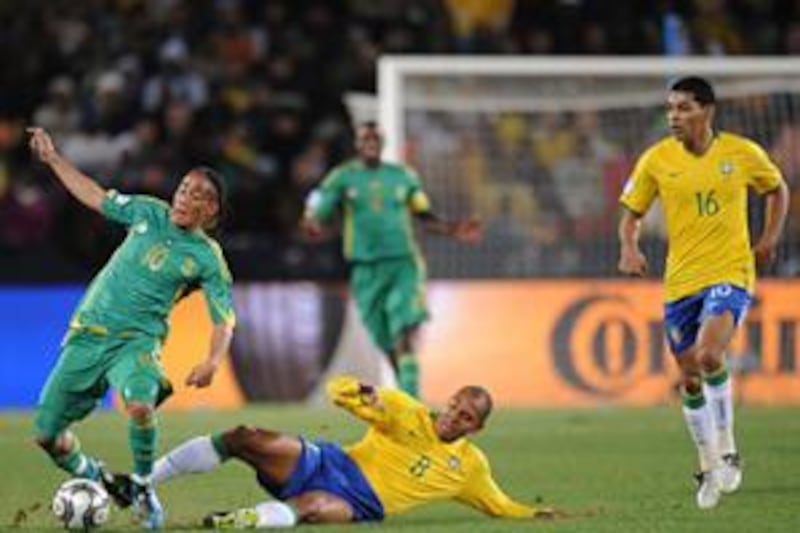A trio of inspectors will arrive in Reykjavik, Iceland on Tuesday on a curious mission. They are there to save the South African football team from embarrassing the nation at the World Cup next June. The three wise men have been sent to the North Atlantic from the southern tip of Africa to "make an assessment", as the South African Football Association call it, of how the host team for the 2010 are shaping up. The answer, lately, has been not so well, otherwise, of course, no emergency watchdog would be necessary.
Two of the inspectors will view Wednesday's friendly between Bafana Bafana, as South Africa's national team are known, and Iceland through the perspective of a more distinguished past. Jomo Sono was the country's greatest player in the 1970s and 1980s, the so-called Black Prince of Soweto, who thrilled local crowds and was good enough to join Pele and Franz Beckenbauer at the New York Cosmos when Manhattan briefly became home to football's biggest stars. Sono never played international football because in his day South Africa were banned from Fifa because of the racist government policy of apartheid, of which men like Sono were victims.
But he did have two relatively successful periods as coach of the Rainbow Nation, guiding them to runners-up spot at the 1998 African Nations Cup and to their first win at the finals of a World Cup, in 2002 (1-0 against Slovenia). His fellow inspector, Clive Barker, did even better in charge of Bafana Bafana. He made them African champions for the first and only time back in 1996. A younger coach, Gavin Hunt, completes the party of assessors. He has been doing well at club level in the SA Premier Soccer League (PSL), Africa's richest domestic competition.
The questions they must all pose themselves is how come, with such a wealthy local league, and only a decade after the national team were at the top of the continent's pile and indeed ranked 16th in Fifa's world rankings, have Bafana Bafana tumbled so far. They are now rated 73rd by Fifa, and although they did make the semi-finals of the Confederations Cup, which they hosted in June, they won only one match of the five they played.
They had already failed to qualify for the 2010 African Nations Cup and they failed to make it beyond the group stages of the 2008 competition. More than a dozen men have been in charge of the Rainbow Nation since South Africa was readmitted to Fifa, as apartheid gave way to democracy in 1992, and the latest, Brazilian Joel Santana, is not sitting comfortably. Nor can he feel at ease when his employers send a quango of experts to run the rule over his work. Nor indeed when no less a figure than Jacob Zuma, the state president, calls for the return to national duty of the enfant terrible of Bafana Bafana, the striker Benni McCarthy.
McCarthy, now a player with Blackburn Rovers in the English Premier League and once a Champions League winner with Porto, is the most gifted South African player of his generation, but his performances with the national team have waned, and his availability has been inconsistent. Indeed, one SAFA official described him last week as a "big-headed superstar" the likes of whom the country could do without.
But can they? World Cups need a rousing display from the host nation to give them a momentum. South Korea, the surprise semi- finalists on their own soil in 2002, would testify to that. Even the USA, a weak team in 1994, made it out of the group stage at their World Cup. But South Africa will need an obligingly mild set of opponents if they are not to fall at the first hurdle. They pick from a set of players with scant experience in the more competitive leagues of the world. Steven Pienaar is impressing at Everton, less so the Bafana Bafana captain Aaron Mokoena at Portsmouth. Veteran midfield marshal Macbeth Sibaya, of Russia's Rubin Kazan, is now playing Champions League football while defender Nasief Morris, of the Primera Liga's Racing Santander, is in Santana's bad books for turning up late ahead of the Confederations Cup.
The rest, in the absence of McCarthy, are made up of players drawn from lesser leagues, or club substitutes' benches, plus footballers from the local PSL. Pienaar has a theory about why a football-loving country are not punching their weight at international level. "Part of the problem is that, compared with some other African countries, some of our players are not hungry enough for success," he said.
"In some ways maybe we're not very adventurous people. We players have to be ready to take responsibility and show we are not just a team with a few individuals." The trio of assessors in Iceland want to see evidence of that, and urgently. @Email:ihawkey@thenational.ae






